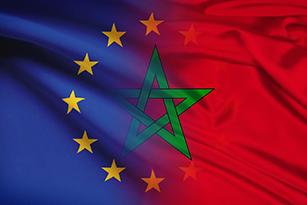
As part of the regular political dialogue between the Kingdom of Morocco and the EU, the Commissioner with responsibility for Home Affairs, Ylva Johansson, and the Spanish Home Affairs Minister, Fernando Grande-Marlaska, met with the Moroccan Minister of the Interior, Abdelouafi Laftit, in Rabat on 8 July 2022.
They highlighted the solid results of their cooperation based on shared responsibility in matters of migration, and agreed to renew their partnership in order to work together to tackle human smuggling networks, in particular following the emergence of new, extremely violent, methods adopted by such criminal networks.
The Commissioner and the two Ministers regretted every death of people attempting unlawful entry, including those that occurred during the recent distressing events on 24 June 2022. They also regretted the injuries, including to members of the Moroccan and Spanish border forces. These events put traditional methods of combatting human smuggling under strain.
Besides the human tragedy, they showed how very dangerous and violent human smuggling networks were, and the extent to which they were prepared to take any risk.
Investigations were under way to clarify the circumstances surrounding these events. At the same time, the Commissioner and the two Ministers welcomed the fact-finding commission set up by the Moroccan National Human Rights Council. The protection of fundamental rights is a value shared by Morocco and the European Union.
The new operational anti-smuggling partnership between the Commission and Morocco to tackle human trafficking will cover, in particular, support for border management, enhanced police cooperation (including joint investigations), awareness-raising on the dangers of unlawful migration and enhanced cooperation with EU agencies responsible for home affairs.
Morocco is a strategic and committed partner of the European Union, with which the EU has been cooperating on migration issues for a number of years. Its National Immigration and Asylum Strategy (SNIA) is one of the most well-developed migration management systems today, in both legislative and institutional terms, and has enabled the legalisation of the administrative status of thousands of migrants, and their integration into Moroccan society. Morocco was also one of the founding States of the Rabat process and his Majesty King Mohammed VI was appointed leader for Africa on the issue of migration by African Heads of State.
Morocco's practical efforts have resulted, in the first half of this year, in preventing more than 26,000 irregular departures – one tenth of them saved at sea. In the same period, Morocco has dismantled around a hundred criminal trafficking networks.
In connection with the New Pact on Migration and Asylum, the Commission is establishing migration partnerships with the countries of origin, transit and destination, to combat human smuggling networks, but also to address the root causes of migration and improve legal migration routes so that people do not feel the need to risk their lives on dangerous journeys.
Details
- Publication date
- 8 July 2022
- Author
- Directorate-General for Neighbourhood and Enlargement Negotiations
